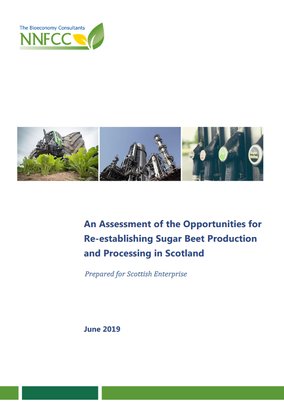 Highlights
Highlights
- How Scotland has favourable conditions for sugar beet cultivation
- Any processing of sugar beet must take place nearby to minimise transport costs
- There is potential for sugar beet to provide a boon to UK bioethanol and biogas sectors
Reasons
to read
- In-depth discussion of possibilities in sugar beet processing
- Discussion of market opportunities for Scottish sugar beet
Number
of pages: 77
Accessibility: This item is freely available
Summary
Scottish
Enterprise and partners have a strategic interest in further developing the
industrial biotechnology (IB) industry in Scotland and have identified the
sugar industry as a potential sector for development.
Scotland
offers favourable conditions for sugar beet production in terms of day
length and soil moisture availability. Eight percent of the Scottish
land area is suitable for arable production, equating to 625,800
hectares. This land lies primarily in East Lothian, East Fife, East Perthshire,
Angus and Morayshire. As a bulky crop with high moisture content,
transport can be costly and therefore any processing facility would need to be
located within or adjacent to key growing regions.
A sugar beet refinery can involve a vast
range of processing steps, and produce a vast array of outputs, from food,
feed, fuel and chemicals, for example. In Scotland, due to pre-existing
markets and competition from other producers, a sugar beet refinery would
ideally focus on bioethanol and sugar syrups, for biofuel and biobased chemical
production, but there would inevitably be additional co-product streams
that could prove valuable as animal feed or for renewable energy
generation. In order to overcome seasonality issues, it may be possible to
import molasses into a sugar beet refinery, which can then be stored and
processed to allow year-round production.
A domestic sugar beet refinery could
produce sufficient bioethanol to meet the current 4% and future 10%
blend requirement in the petrol fleet in Scotland, which amounts to 57
million litres in total. Up to 20,000ha of land could be
utilised, delivering over 170 million litres of bioethanol per
annum from over 1.6 million tonnes of beet. Significant quantities of pulp
could also be generated, and biogas could potentially be produced from
additional outputs in the absence of higher value market outlets.
There are clear benefits, in terms of
Scottish and UK food and energy security and potentially also in terms of the
resilience and security of Scottish farming businesses if sugar beet were to be
produced and processed in Scotland. Sugar beet ethanol shows high land
efficiency and also compares
well to other crops in terms of water usage and broader sustainability, as well
as offering high levels of employment, both in sugar beet production and
processing activities. A Scottish sugar beet refinery will help both
Scotland and the UK to meet sustainability
and decarbonisation targets, as well as contributing to
the wider bioeconomy, which is
expected to double in size by 2030.
You may also be interested in: